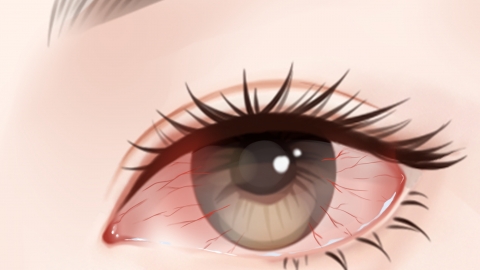What should patients with conjunctivitis (red eye disease) avoid eating?
"Red eye" usually refers to acute bacterial conjunctivitis. In general, patients with acute bacterial conjunctivitis should avoid eating foods such as chili peppers, ginger, garlic, Chinese chives, and lamb. They should also avoid taking medications such as dexamethasone acetate tablets, prednisolone tablets, loratadine syrup, chlorpheniramine maleate tablets, and diphenhydramine hydrochloride tablets. Detailed explanations are as follows:
I. Foods
1. Chili Peppers
Chili peppers contain capsaicin, a spicy and irritating substance. Patients with acute bacterial conjunctivitis already have ocular inflammation; consuming chili peppers may stimulate an inflammatory response in the body, worsening symptoms such as ocular congestion, swelling, and pain, and delaying the resolution of inflammation.
2. Ginger
Ginger is warm in nature and has certain irritant properties, which can increase internal heat. Acute bacterial conjunctivitis is often caused by bacterial infection and inflammation. Consuming ginger may intensify internal heat symptoms, leading to worsening ocular inflammation, such as increased secretions and a stronger sensation of burning in the eyes.

3. Garlic
Garlic contains allicin and is highly irritating. After consumption, it may stimulate the body, intensifying the ocular inflammatory response, potentially interfering with the body's anti-inflammatory processes, delaying the recovery from acute bacterial conjunctivitis, and even causing the condition to persist.
4. Chinese Chives
Chinese chives are warm in nature and are considered pungent-warm foods that may increase internal heat. Patients with acute bacterial conjunctivitis who consume Chinese chives may experience increased activity of inflammatory factors in the body, worsening symptoms such as redness, swelling, and pain in the eyes, and interfering with the normal resolution of inflammation.
5. Lamb
Lamb is warm and heaty in nature and has nourishing properties. During the acute inflammatory phase of bacterial conjunctivitis, consuming lamb may exacerbate internal heat, intensify ocular inflammation, hinder recovery, and possibly prolong the course of the illness.
II. Medications
1. Dexamethasone Acetate Tablets
Dexamethasone acetate tablets belong to the class of glucocorticoids and have immunosuppressive and anti-inflammatory effects. Acute bacterial conjunctivitis is caused by bacterial infection; using this medication may suppress the body's immune response, reduce resistance, and potentially promote bacterial proliferation and spread, worsening the infection.
2. Prednisolone Tablets
Prednisolone tablets are also glucocorticoids that may suppress local immune defense functions in the eye. Using this medication before bacterial conjunctivitis is controlled may mask the symptoms of inflammation, promote bacterial growth, lead to the spread of infection, and cause more severe ocular complications.
3. Loratadine Syrup
Loratadine syrup is an antihistamine primarily used to treat allergic reactions. Acute bacterial conjunctivitis is caused by bacterial infection, not an allergic reaction. Using this medication will not address the underlying cause and may delay proper treatment, affecting the control of inflammation.
4. Chlorpheniramine Maleate Tablets
Chlorpheniramine maleate tablets are antihistamines mainly used to relieve allergy symptoms. The cause of acute bacterial conjunctivitis is bacterial infection, and this medication has no therapeutic effect on bacterial infections. Using it blindly may delay appropriate treatment and hinder the resolution of inflammation.
5. Diphenhydramine Hydrochloride Tablets
Diphenhydramine hydrochloride tablets are antihistamines suitable for allergic conditions. Acute bacterial conjunctivitis is caused by bacterial infection; using this medication will not kill bacteria or control inflammation. Instead, failure to receive timely and appropriate treatment may worsen the condition.
In daily life, it is important to maintain good ocular hygiene, avoid rubbing the eyes with hands, and keep the eyes clean. If symptoms of acute bacterial conjunctivitis appear, seek medical attention promptly and follow the doctor's guidance to select appropriate medications. Do not self-medicate or consume prohibited foods.




